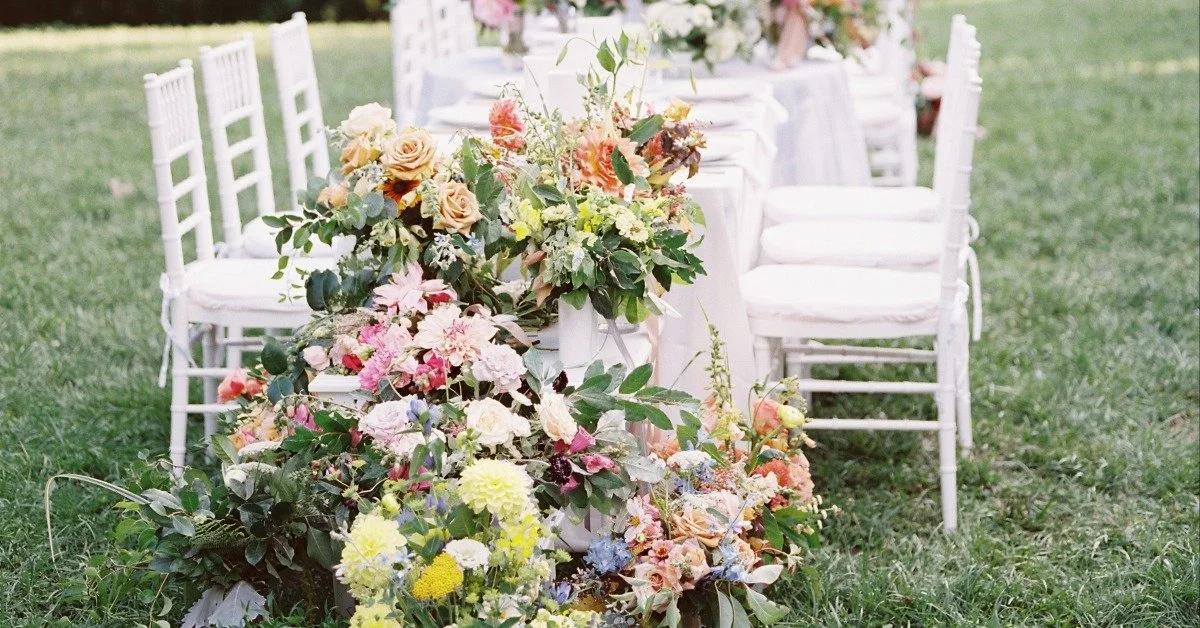3 Ways to Make Virtual Workshops Stand the Test of Time
In-person workshops are magical, but it’s time to learn to bring that magic through a screen!
Heather Payne Photography
The last two years have been… what's the word again? Oh yes, challenging.
And let's face it–many of our pandemic habits are here to stay, for better or worse.
One of those habits, or ways of working regardless of sector or profession, is the virtual collaboration space.
Specifically, for florists who offered in-person workshops and classes pre-pandemic, shifting to virtual classrooms is a way to engage customers and maintain a stream of revenue when many other aspects of floristry have ground to a halt.
As the token workshop leader of the company for which I work, Blossom Cleveland, I’ve always loved interacting with customers who wanted to learn more about creating arrangements.
Students had a visceral reaction when it all clicked for them in the workshop; symmetry, proportions, color—this hands-on way of learning was surely the only way! Flowers are ephemeral and tangible, after all. Their life is finite and textured, and learning how to bring it all together for an arrangement they’re proud of and inspired by can only be taught in 3D.
Or so I thought.
Now, nearly two years later, here are three surprising benefits to virtual workshop classes that I believe work for both students and teachers.
Virtual workshops can involve family and friends, near and far
One of my favorite parts of virtual gatherings is the ability to host families and friends who are spread out across the country.
I recall a virtual class I did in 2020 with a family who gifted the grandmother an arrangement workshop for her birthday. Family in Ohio, New York, and California were able to celebrate and learn together. More friends and family joined our virtual Thanksgiving workshop for a floral centerpiece.
And virtual workshops with attendees from across the country is also a great way to expand your customer base. If a cousin in Texas participates in a virtual flower workshop with a Pennsylvania florist, that cousin is more likely to purchase flowers from that Pennsylvania florist for your birthday or anniversary.
So the experience comes full circle!
The pace and tone of virtual classes can be beneficial to both teacher and student.
Flexible flower options are available
Another benefit of working with an audience that could be joining in from anywhere is the different floral offerings other parts of the world offer.
While I have not had anyone participate from outside the U.S., I have certainly had participants from coast to coast, meaning different flower discoveries for the arrangement.
Cleveland is in Zone 6, which means we don't have much growing locally for about half of the year.
So as an instructor, it is a delight to be exposed to what can grow in Florida, Washington, and Arizona and think about how those options can work together in an arrangement!
Virtual classes can allow for a smoother pace
There is a different energy to workshops taught virtually vs. in-person, and both have pros and cons.
Sometimes I find in-person classes overwhelming because the participants often know each other and are having a great time together (read: they are loud). Virtual classes allow you to control the pace and volume better because everyone has to be more attentive to gain the same experience.
What is taught in person can sometimes be missed virtually, so you really have to slow down and emphasize the logistics. I had someone in a virtual class ask me at the very end of the lesson when the water is supposed to go in the vase. How could I forget to mention putting water in the vase!?
Admittedly, I thought it was obvious because it was something I would do in person, and everyone would follow suit. But not in the virtual class! I did not say it aloud, so I responded, "Now is a good time to fill your glass half full." Ownership of our own experiences gives us a lot to aim for when we move back to our in-person, 3D world again.
So how do we ensure virtual workshops are a long-term option for our floral businesses? Here are my recommended Do's and Don't's to help them stand the test of time:
DO
Offer a list of flowers you will use along with substitutes, so those attending virtually have options in their corner of the world. Images of the flowers are a plus!
Limit the number of virtual attendees to 8 (6 seems to be my sweet spot!).
Provide a survey or similar feedback form for attendees to continue sharing what works and what doesn't as your classes evolve.
The pandemic brought changes, but it doesn’t have to mean the end of workshops!
DON'T
Don’t exclude a list of specific materials virtual attendees will use, such as snips and vases (with size), or allow those nearby to purchase them from your shop.
Don’t assume you should mail materials to all guests unless you want everyone working with exactly the same materials. Shipping can be expensive, and many people already have these items at home!
And don’t forget your timer! Virtual classes take some practice to pace right, so keep track of time and keep everyone moving, which will require more energy and enthusiasm on your end.
Looking beyond the pandemic, what other adaptations can we control and make work to our business and customers' benefit?
Time, creativity, and demand will tell. But at least we know, for now, when to fill the glass half full.









